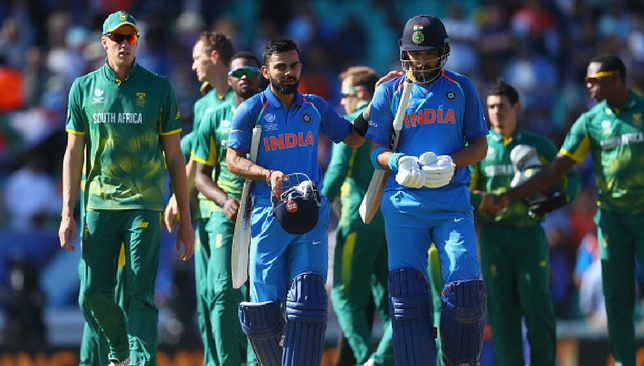
Is there any team in world cricket that wants to win an ICC tournament more than South Africa? They have one title to their name, the earliest avatar of this ICC Champions Trophy, won back in 1998 when it was named the ICC Knock Out. That triumph is only a faint memory for anyone related to this cricket team, and undoubtedly it doesn’t count for much.
You just have to listen to AB de Villiers talk about what it means to win an ICC tournament. He has not experienced it before but aspires to before he hangs up his boots, which by the look of things could be as soon as 2019. In that light, another opportunity has gone a-begging. South Africa – the world’s No1 ranked ODI side – are out of the 2017 Champions Trophy.
That, however, is an understatement. India’s margin of victory – by eight wickets – and the fact that the Proteas were bowled out for just 191 runs in 44.3 overs says it was a thorough pummeling. Dig deeper through what transpired though, and it would seem another case of hara-kiri from a South African cricket team.
“We do come up short for some reason in tournaments like this, and it is pretty sad. I cannot explain to you what exactly happens. I think you saw it out there today,” said de Villiers, at a loss of words to explain how the No1 ranked side was ousted after two losses in three matches. “It was just a poor batting performance and nothing to do with the energy or intensity or believe in the team. We felt we had a great chance today. We came here to win a game of cricket, (but) then we just unravelled as a side out there.”
Want to say this is a catastrophic innings for South Africa. Seems like an understatement. #INDvSA #CT17
— Chetan Narula (@chetannarula) June 11, 2017
Put into bat, the slide began when Ravindra Jadeja (1-39) bowled Quinton de Kock (53). That wicket was etched out by a clever plan – the batsman bowled immediately after attempting a reverse sweep on the previous ball. In a way, it undid the work done by the opening duo of de Kock and Hashim Amla (35) who had put on 76 runs. That is how South Africa, like most teams in the competition, have played so far – keep wickets in hand and then charge later in the innings.
Only it didn’t work this time, as two run-outs put paid to de Villiers (16) and David Miller (1), triggering a collapse that saw eight wickets fall for 51 runs.
“I take full responsibility for the first run-out with AB. It was my call and my fault. I thought there was a run there. Then, we had the second run-out because of confusion with Miller. We were never able to recover from that,” said Faf du Plessis (36), involved in both mix-ups.
Let it be said here that it wasn’t all South Africa’s own undoing. India played a helping hand of course; first with a tight line in the first 10 overs as South Africa were restricted to 35-0, and then, piling on the pressure when the run-outs came about.
![AB de Villiers walks back after his run-out [Getty Images]](https://sport360.com/wp-content/uploads/2017/06/AB-de-Villiers-1.jpg)
AB de Villiers walks back after his run-out [Getty Images]
They were bowling to a plan, as always, but their intensity in the field was once again very familiar. This was a modern-day Indian team as we have come to know – athletic, energetic, pushing the opposition by cutting out errors on the field and inducing mistakes that lead to chances for wickets, never mind saving runs alone.
The Men in Blue – from Yuvraj Singh on old legs, to fast bowlers like Jasprit Bumrah, to the skipper himself – were throwing themselves all over the park, and were all over South Africa’s batsmen like a rash.
“It is known how we wanted to improve our fielding. I think we needed this kind of a fielding performance, and before going out, we had a chat in the huddle that I want to see everyone’s intensity go up. That was a conscious effort we have to make individually in such a big game,” Kohli said after the match.
Congrats to India. They were just a class apart today. Very professional & skillful performance. Early tone set by Bumrah & Buvi. #CT17
— ian bishop (@irbishi) June 11, 2017
Once South Africa were reduced to 142-4 with de Villiers and Miller back in the hut, it was about not letting the game drift away and keeping the target as low as possible.
No one though could have imagined the Proteas – with four batsmen in the top ten ODI rankings – to fold for a sub-200 total. On pitches where 300-plus is just about par, this was an unacceptable innings. South Africa self-combusted, really, and India were never going to be in trouble, as seen in the ease with which they chased it down.
In the end, then, it is once again about desire – the regular absentee on a big day for one team while the other lifted itself into the semi-finals. De Villiers might defend it, du Plessis might acknowledge blame for a middle-order collapse, and others will scratch their heads as to what went wrong again.
Meanwhile, another chapter has been written down in South Africa’s sad, almost pitiful history in ICC tournaments.